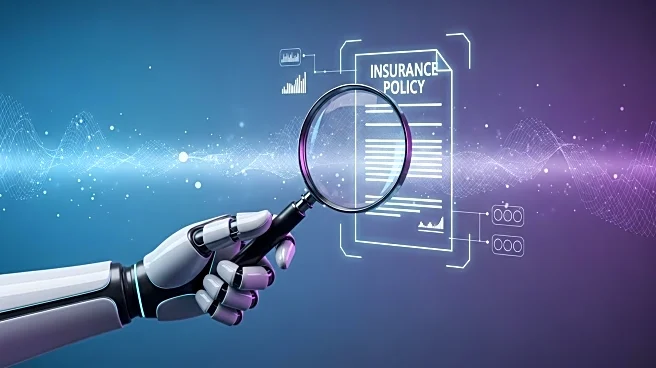What is the story about?
What's Happening?
Artificial intelligence (AI) is increasingly influencing the insurance industry, particularly through the development of agentic AI systems. According to a report by Economist Impact, sponsored by SAS, agentic AI tools are capable of autonomously performing complex tasks such as responding to emails, updating databases, and transforming data. Jodie Wallis, global chief analytics officer at Manulife, notes that insurer workforces are evolving into hybrids of human employees and AI agents, collaborating closely. While early adopters of AI are experiencing productivity gains, these benefits have not yet translated into significant cost savings due to the need for additional infrastructure to support AI-driven business workflows.
Why It's Important?
The gradual integration of AI into the insurance sector signifies a shift towards more efficient operations and enhanced customer experiences. Agentic AI tools are expected to accelerate repetitive and data-intensive tasks, allowing human employees to focus on creativity, judgment, and relationship-building. This transformation could lead to improved risk modeling and regulatory compliance, offering competitive advantages to companies that effectively integrate AI. However, the need for infrastructure development highlights the challenges in realizing immediate cost savings, suggesting a long-term investment strategy for insurers.
What's Next?
As agentic AI tools continue to develop, insurers may need to invest in infrastructure to fully leverage AI capabilities. This could involve enterprise-wide transformations where AI agents operate autonomously or alongside human teams. Insurers might focus on integrating AI with domain-specific solutions to tackle complex challenges, potentially leading to faster services and reduced operational leakage. The industry could see a shift in workforce dynamics, with human employees concentrating on areas where they can make the most impact.
Beyond the Headlines
The ethical implications of AI in insurance are significant, as the technology could redefine job roles and require new skill sets. Insurers must consider the balance between AI autonomy and human oversight to ensure ethical standards are maintained. Additionally, the cultural shift towards AI-driven operations may necessitate changes in organizational structures and employee training programs.
















